With a year like 2020, what could be more fitting than a disaster film involving an E.L.E. aka Extinction Level Event, and in this case, a comet named Clarke heading straight for Earth. We’ve seen asteroid scenarios on film before, but thanks to director Ric Roman Waugh, a strong and well-crafted script by Chris Sparling, standout performances by Gerard Butler and Morena Baccarin, and non-stop riveting action, what sets GREENLAND apart from the rest is not only the level of authenticity and realism (right down to CQ calls on ham radio) but the humanity that we see and feel; the good and the bad. This isn’t about who lives and dies on an extinction-level scale, this taps into the everyday needs of the average family with a son who relies on life-giving insulin. This is about who “lives”. That puts an entirely different spin on decisions made and actions taken. But this is what makes Waugh’s films so compelling. It’s not just the action at which he is so adept. It’s the exploration of those grey areas of life and the human condition. With GREENLAND, he mines gold.
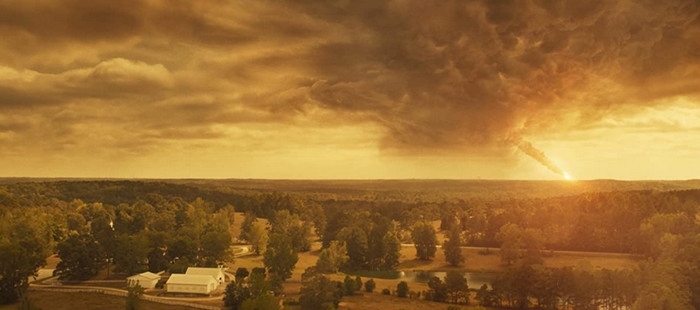
The world is aflutter with excitement about the approach of the comet Clarke which has suddenly appeared from another galaxy on a trajectory set to whip around Earth, destined to be a visual sight for all, including John Garrity. An architect and engineer, Garrity is as excited as everyone else until pieces of the comet hit Earth and wipe out part of Florida. This is not going to be a splendor to ooh and aah at. Clarke is deadly. First and foremost in Garrity’s mind is his son Nathan and estranged wife Allison who live in a peaceful Atlanta suburb.
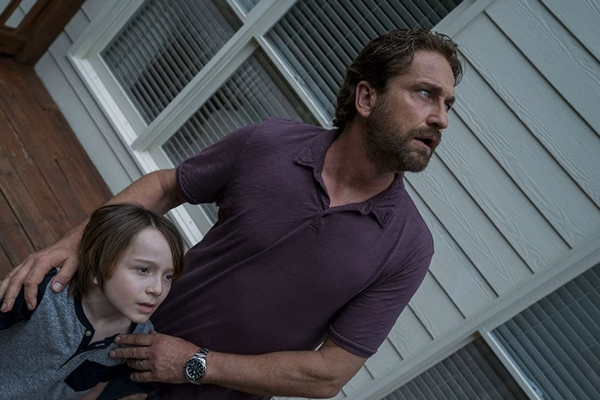
Luckily for the Garritys, and much to the chagrin and anger of their friends, they have been selected by the Department of Homeland Security to be taken to an undisclosed location and must report to a military base within a limited amount of time or lose their places on the sacred flights. Unfortunately, they are met with a multiplicity of obstacles, not the least of which is leaving Nathan’s insulin in the car. As John heads back through lines of traffic and abandoned cars to get the insulin, the unthinkable happens when Allison and Nathan are denied access to the departing planes because of Nathan’s medical condition.
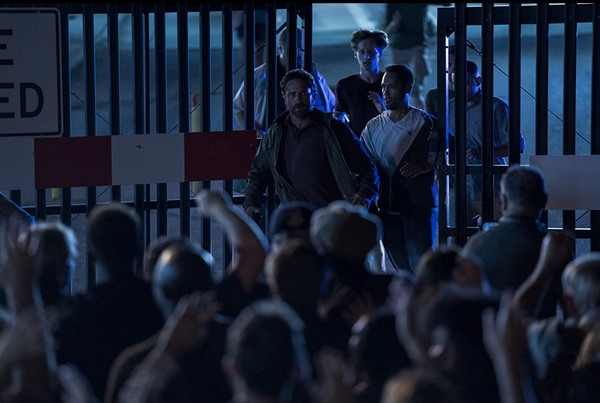
Now separated and neither John nor Allison knowing where the other is (and thanks to downed satellites and cell towers, cell phones aren’t working), they must overcome violence, shockwaves, and Nathan’s worsening condition as they struggle to not only find each other and reunite as a family, but find a way to make it on their own to GREENLAND which is where the government bunkers are located.
As John Garrity, we get to see something from Gerard Butler that is a rarity – vulnerability, insecurity, and indecisiveness. A key moment of “breakdown” in an empty house speaks volumes about John. We feel his pain and anguish. But what takes both John and Butler’s performance to the next level is when he goes one-on-one with Scott Glenn where we see that John is a man with a conscience, a man driven by that conscience. He has ethics. And he feels remorse when he does something that is not keeping with his core ethics. He is flawed, and he may hate himself for being flawed, but those flaws make him more human and humanize him to those around him and to the audience. He knows there is a moral price to pay for those flaws. Not only is the character well written and emotionally layered, but Butler brings him to life, building up to the kick-ass Gerard Butler we all know and love.
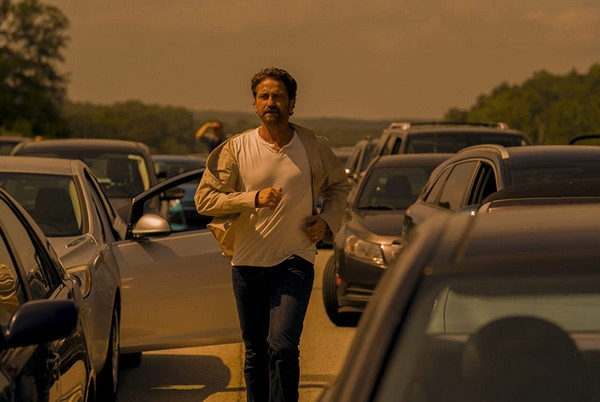
But talk about bringing someone to life! Look no further than Scott Glenn as Allison’s father, Dale. We saw what Waugh did with Nick Nolte in Angel Has Fallen and does something equally as powerful here with Glenn. Glenn’s Dale serves as the North Star, a moral compass that truly brings the family together while giving the audience deeper perspective on life. And this is where the talents of Waugh’s longtime cinematographer Dana Gonzales really shine as it is impossible to look away from Glenn. Masterful lighting and lensing with metaphor and visual storytelling, the heart breaks with some tissue-worthy moments between Glenn and young Roger Dale Floyd’s Nathan as Gonzales pushes the camera in on Glenn’s face, capturing his expressiveness, his eyes, the life in those lines on his face. We’re already feeling the power and emotionality of Dale’s words, but the visuals take the emotion to the next level. And dare I say it, but there is a stunning shot of Glenn standing outside looking up the sky, very similar to a shot of him as Alan Shepherd in The Right Stuff.
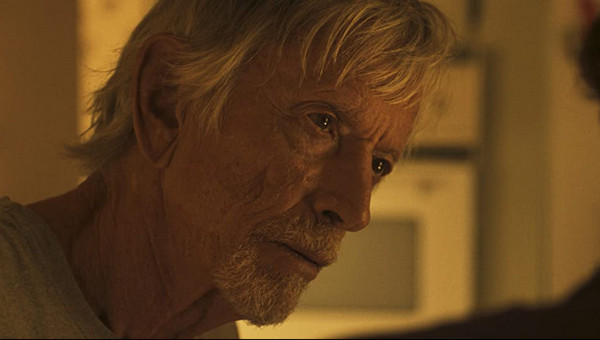
As Allison, Morena Baccarin gives new meaning to the emotions of motherhood. She would give a lioness protecting her own cub a run for the money. Baccarin is rock solid, delivering layers of emotion as she hides fear from her child, fights anyone who gets in her way, finds her own strength and overcomes any insecurities and hysteria that she had with the first strike of Clarke.
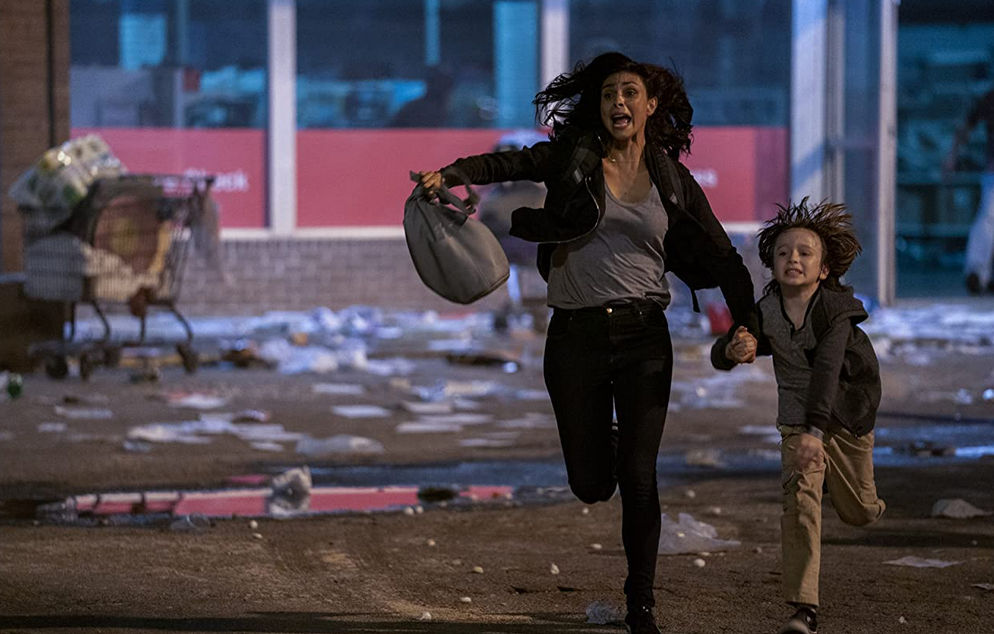
Roger Dale Floyd steals your heart as Nathan. He is a little charmer and watching the chemistry between Floyd and Butler is pure joy. Nice to see Holt McCallany pop up as a bush plane pilot. Do not overlook David Denman as Ralph, a man who will do anything to save he and his wife.
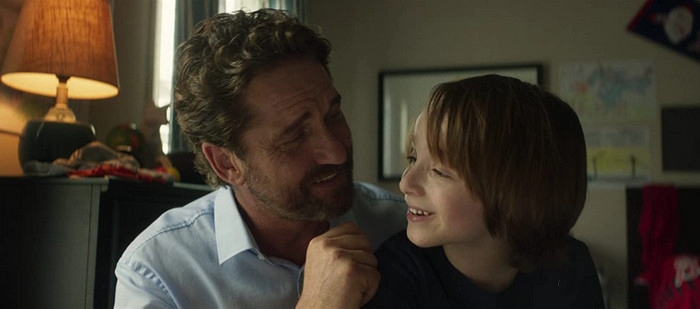
This is where solid story structure really comes into play, and the shades of grey in the examination of the human condition, morals and ethics, an individual’s conscience. Just one example is Denman’s character of Ralph willing to do anything to save himself – and with no remorse or regret. On the other hand, you see Butler’s John grieving with hands shaking after being pushed to the extremes. Two men acting to save themselves, but with totally opposite intent and moral repercussion. The moral ambiguity that we repeatedly see throughout the film is fascinating to watch.
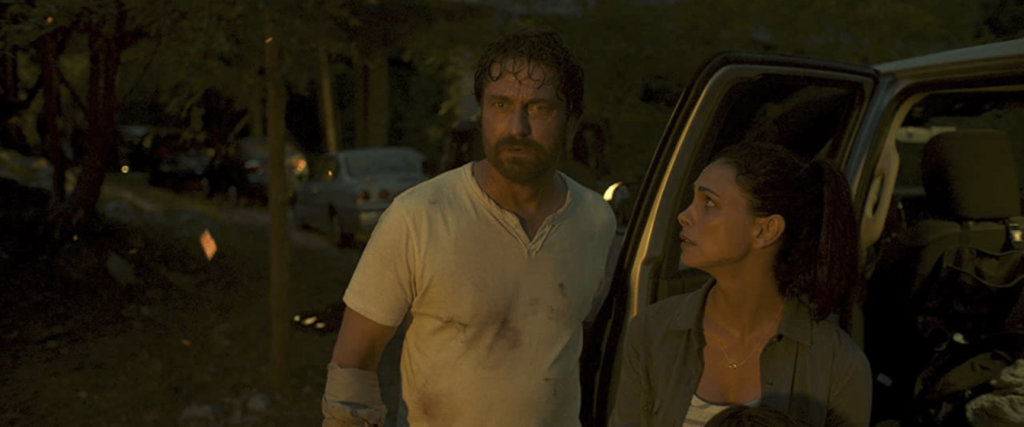
But this is the end of the world and what would that be without action and disasters. Waugh doesn’t disappoint. I think he’s outdone the record explosions clocked with Angel Has Fallen. With GREENLAND, we’ve got explosions on the ground, car crashes, multiple planes exploding at an airbase, comet crashes, fiery bits of comet raining from the sky. And Waugh is a strong believer in practical in-camera effects so the reactions we see from the actors are genuine. Also to be commended is the VFX team with the creation of the entire sky design as it filled with the reddish-orange glow of hundreds of bits and pieces blazing like shooting stars plummeting to earth. The night scenes are exquisite. Visually, Waugh draws us into the film with Clarke and its antics – the majesty and power and wonder of it, the beauty of it – but then counters that with the horror and devastation that that beauty brings. The juxtaposition is stunning and thought-provoking.
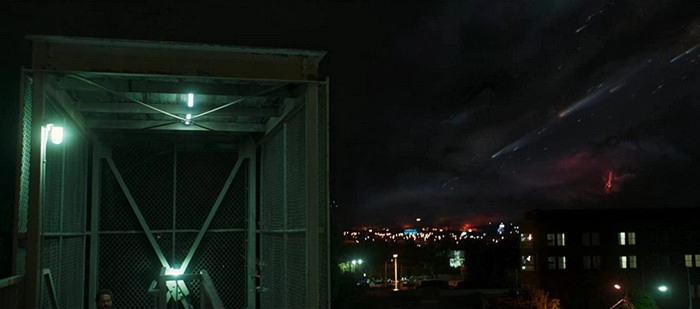
The action is fabulous as is the lensing of it. Multi-person fights inside the back of trucks, immersive, claustrophobic, and close-quartered and showcased with killer handheld work. Plenty of man on man fights as well as some tight fight choreography involving Butler. All well designed and well executed. Some exciting car action as well that plays out to massive traffic jams and falling bits of comet and shockwaves.

Again, as usual Dana Gonzales does an impeccable job with lighting and lensing. The contrast in palette and lighting with Dale’s farm and the crumbling burning world we witness as the family struggles to get to this heaven on earth is glorious. There is hope. There is peace. And then flashback sequences. Close-ups, intimate, bright, happy. Those are the images you want to remember while you are alive, not in the final moments of death.
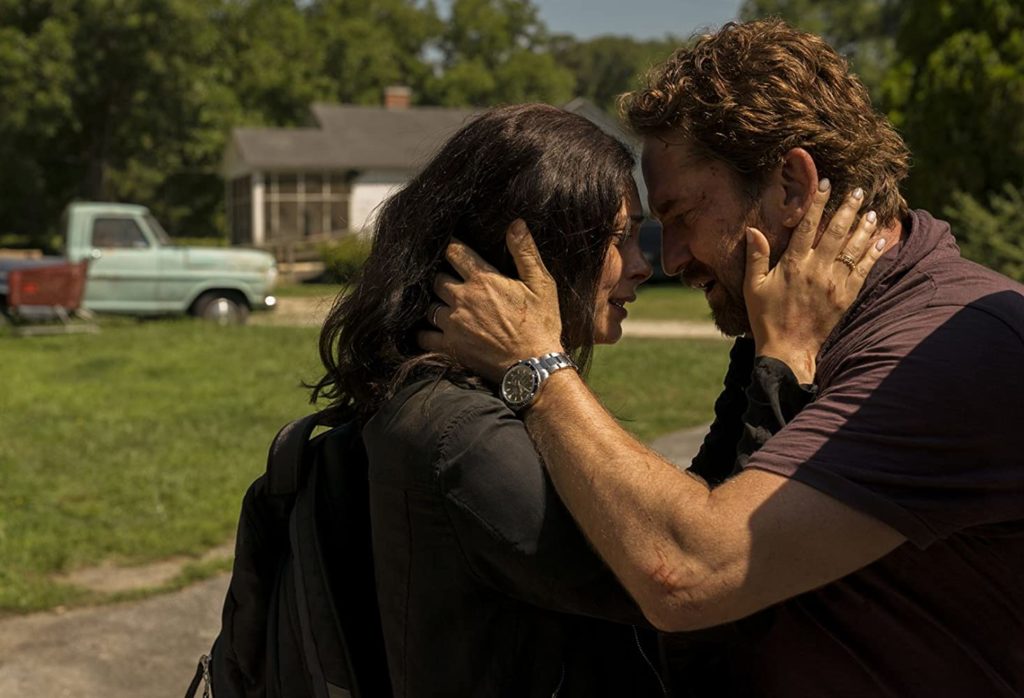
Composer David Buckley is another great part of Waugh’s collaborative team. This is a very unique score incorporating non-verbal chorale that is both reverent and chilling. We feel Armageddon upon us. The hellfire of Revelations is here. We hear and feel that with the score. And it keeps you on edge and a bit unsettled.

At the end of the day, or the film, one can’t help but look around at this world we are now in and take stock of oneself, asking those tough questions about right and wrong, and the lengths you would go in order to survive, the moral and ethical questions, as well as how would you want your last moments to be – fighting and clawing and looting and robbing and harming others? At peace knowing you lived a good life? Or atoning and apologizing for the mistakes and flaws, hoping to be a better person on the other side, be it the other side of the ocean safe in GREENLAND or “on the other side.”
GREENLAND taps into the human condition and finds humanity, delivering a thought-provoking film with killer action, powerful emotion, a comet named Clarke, and Gerard Butler.
Directed by Ric Roman Waugh
Written by Chris Sparling
Cast: Gerard Butler, Morena Baccarin, Roger Dale Floyd, Scott Glenn
by debbie elias, 09/02/2020












